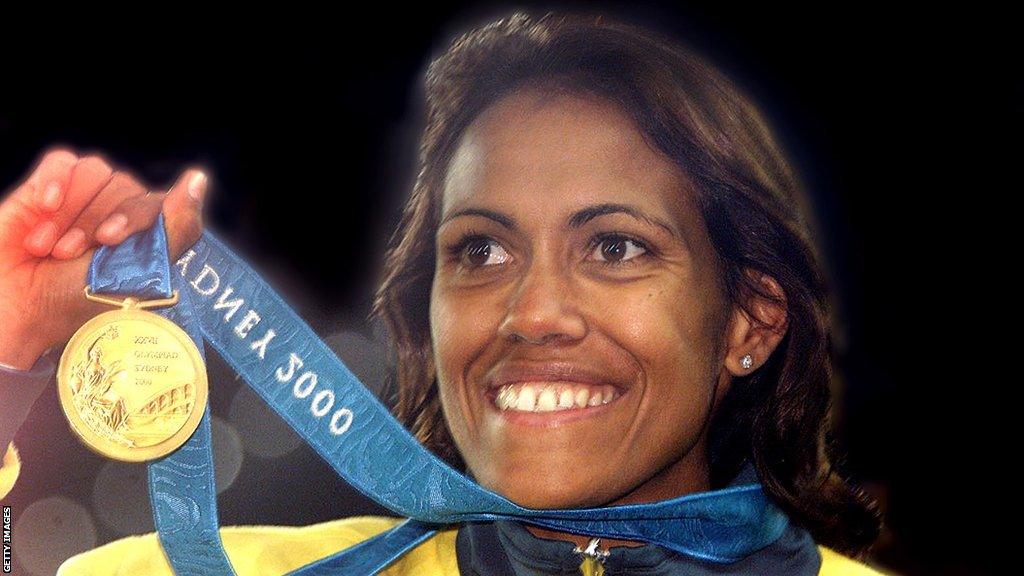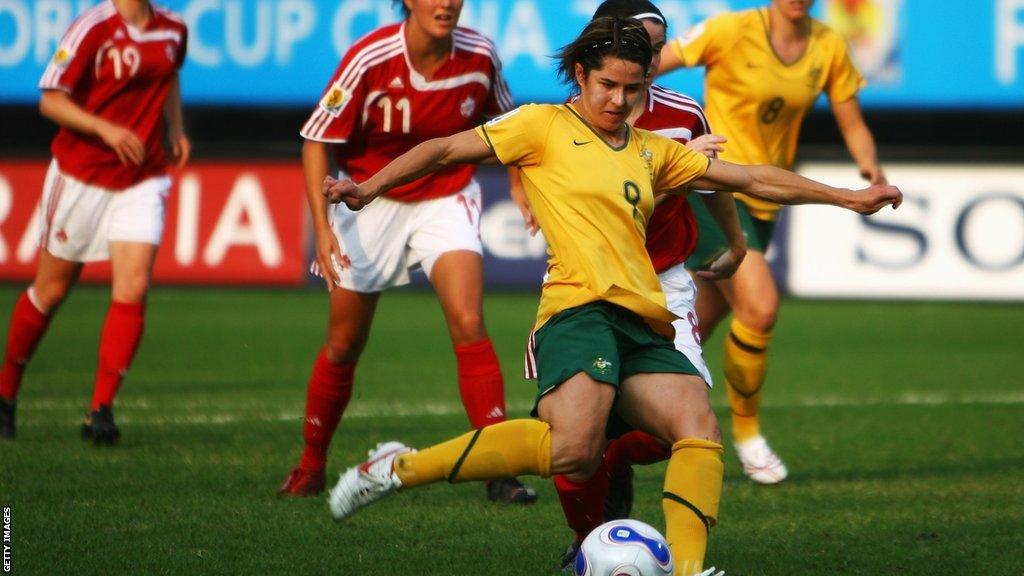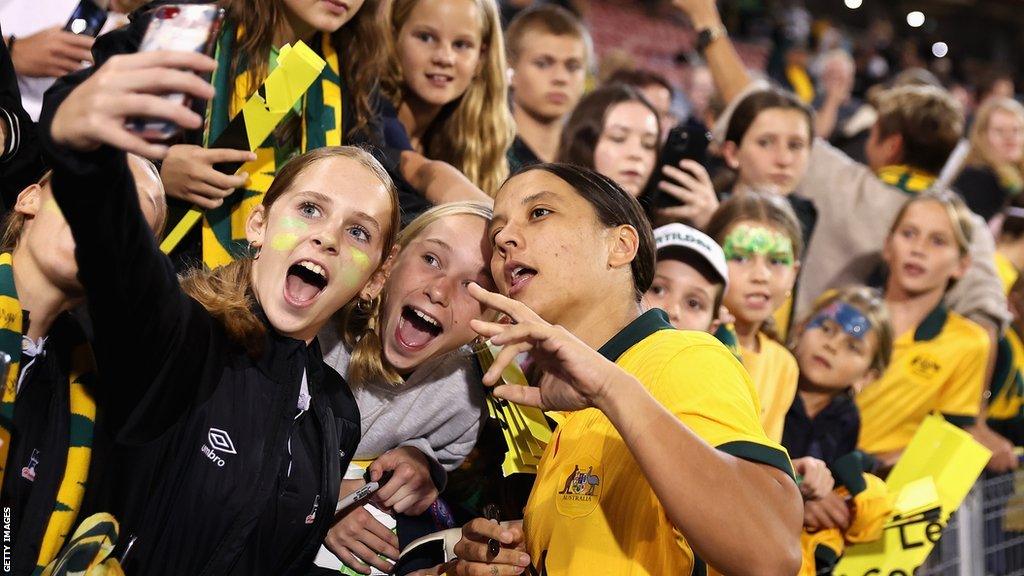Women's World Cup: Australia seek a Cathy Freeman moment at 'football's Sydney Olympics'
- Published
Women's World Cup: 'This can be football's Sydney Olympics'
"This is our moment. We want to make this as big as the 2000 Sydney Olympics for Australia, and for football we have to leave more than just memories."
Sarah Walsh's job title is almost as long as her career as a goal-scoring Matilda.
As head of women's football, Women's World Cup legacy and inclusion at Football Australia, the 40-year-old from New South Wales is relishing the task of making a significant impact on the long-term success of football in a country co-hosting its first senior-level Fifa tournament.
The ambition is high. The 2000 Sydney Olympics were almost universally judged a roaring success, with Lord Coe admitting the London 2012 committee "attempted in a number of ways to emulate what the Sydney organising committee did".
'A moment to equal Freeman'

Cathy Freeman's 400m gold medal win at the 2000 Sydney Olympics has been an inspiration for many Australian athletes
Walsh was 17 when she witnessed Aboriginal Australian sprinter Cathy Freeman winning an iconic gold medal in the 400 metres at those Olympic Games.
She wants the new generation of Australian footballers to be similarly inspired and inspiring at this Women's World Cup, which begins on Thursday.
"I remember where I was, just a kid wanting to go to the Olympics, wanting to be Cathy. This current Matildas team talk about it too," said Walsh. "We're drawing threads between this World Cup and the 2000 Olympics.
"I'm looking forward to 10 years' time, when people look back and relive those moments. Where were you when that happened, like a Sam Kerr backflip after a goal? A moment that will equate to Cathy Freeman."
'We knew we were pretty good'

Sarah Walsh was part of the Matildas team that reached the quarter-finals of the 2007 Women's World Cup in China
Walsh knows first hand the long journey taken by the Matildas to earn a place at football's top table.
Now ranked 10th in the world by Fifa, she was part of the 2007 squad that went to China not knowing how things would turn out on the field. Australia had qualified for the three previous tournaments but not won a match.
"We didn't know if we were good enough", she recalled. "It was the first time we had qualified through the Asian Confederation, and we were untested at this level.
"I scored the first goal against Ghana in a 4-1 win in the group, and we knew then we were pretty good!
"We then drew with Canada and Norway and reached the quarter-finals."
They were eventually knocked out by Brazil, but the standard was set, and the Australian public responded.
"We had a TV documentary crew with us at the tournament", Walsh added. "We were part of history. One specific was I came back to Australia and I didn't have to explain what a 'Matilda' was any more.
"That was the incremental change I was part of. Now this current crop of players are leading another step change. We see now that the Matildas are ahead of the Wallabies in brand awareness."
Legacy is at the heart of what Walsh and her team at Football Australia are building. It's a word often used after each major sporting event, so what are the specifics that are in place to ensure future Matildas come through the ranks?
Walsh said: "We've received over 300 million Australian dollars [£157m, $206m] through federal or state government as a result of hosting. Adelaide's Hindmarsh Stadium complex has had 53 million dollars of investment - that will benefit Adelaide United in the Women's A-League.
"We have an ambitious goal to reach 50:50 female and male membership in grassroots football. We have a framework at national level for pay parity between the Matildas and Socceroos, so why can't we take that to all levels of the game?
"There will be better decision-making for women and girls, like having better irrigation on pitches, and more lighting. We're more sophisticated in working on what the barriers are."
'My advice is to enjoy yourself'

Sam Kerr will lead Australia's attack at the World Cup, having scored 63 goals for the Matildas
And what of any advice she may give the 2023 Matildas, as they aim to reach a World Cup semi-final for the first time?
"I didn't play a World Cup on home soil," Walsh said. "But I was given some advice from Dianne Alagich [who won 86 caps for Australia] when I was just breaking into the team.
"She said: 'Just enjoy yourself, that's when you play your best.'
"That's what I would say to the likes of Sam Kerr. You enter the game as a five-year-old to enjoy it. Sam always plays her best when she is happy, so that's my advice: 'Enjoy yourself.'"
Walsh intends to enjoy every moment of this World Cup. She is delighted the competition has been expanded to 32 teams - including eight debutants this time - some of which she saw at the qualifying tournament staged by finals co-hosts New Zealand.
"I was lucky enough to see Haiti qualify. Imagine the benefits and learnings for that federation and for those players," Walsh said. "People could say it may provide a lop-sided tournament, but it's important for the development of the game.
"We've been on that journey, since our first World Cup. Fifa has an ambitious goal to reach 60 million global participants in the women's game, and each federation has a role to play."
Walsh's role will not be defined by Australia winning or losing the World Cup. She's looking at the broader spectrum and what hosting games in Sydney, Brisbane, Melbourne, Perth and Adelaide will mean to future generations.
"We're on track for this to be the biggest Women's World Cup ever," she said. "Over two billion people will watch, 1.5 million fans will attend matches.
"This month is going to leave imprints in people's minds, and elevate football to where it belongs in Australia."